Which locations have the most cyber security job openings? What are the most in-demand specializations? Am I getting a fair salary? How should I map my potential career trajectory? These are exactly the types of questions that the latest cyber security job statistics can help you answer.
The picture they paint is complicated. Nearly 5.5 million people work in cyber security worldwide, yet an estimated 4.8 million positions remain unfilled; a gap that grew 19% in 2024 alone.
Budget constraints are now the leading reason those roles stay vacant, even as overall security spending continues to climb. Meanwhile, skill deficiencies within existing teams are worsening alongside the raw headcount shortage, not replacing it.
With all of this in mind, here's a rundown of the key cyber security job statistics and trends.
Current State of Cyber Security Employment
The global cyber security workforce continues to grow, but the headline number obscures a more varied picture. Overall growth has slowed sharply, and several major markets including the United States and United Kingdom actually contracted. What's driving the spending side is covered below, but the workforce numbers alone are worth examining closely.
The Size and Growth of the Global Cyber Security Workforce
- In 2024, ISC2 estimated the size of the global cyber security workforce at 5.47 million professionals.
- Growth has stalled dramatically. Between 2023 and 2024, the workforce grew by just 0.1% — down from 8.7% growth the year before. This is the slowest growth rate since ISC2 began tracking.
- Regional growth was uneven. The Middle East and Africa saw the strongest workforce growth at +7.4%, followed by Asia-Pacific at +3.8%. However, North America declined by 2.7%, Europe by 0.7%, and Latin America by 0.9%.
Location of Cyber Security Jobs
- The United States has the world's largest cyber security workforce, estimated at 1.3 million professionals — though this represents a 3% decline from 2023.
- Here's a breakdown of the largest national cyber security workforces in 2024:
| Rank | Country | 2024 Workforce | Change from 2023 |
| 1 | United States | 1.299 million | -3.0% |
| 2 | Brazil | 752,000 | +0.4% |
| 3 | Japan | 500,000 | +4.0% |
| 4 | Germany | 439,000 | -3.7% |
| 5 | Mexico | 422,000 | -2.7% |
| 6 | United Kingdom | 349,000 | -4.9% |
| 7 | South Korea | 273,000 | +3.3% |
| 8 | France | 230,000 | +6.1% |
| 9 | South Africa | 197,000 | +10.7% |
| 10 | Spain | 188,000 | +3.0% |
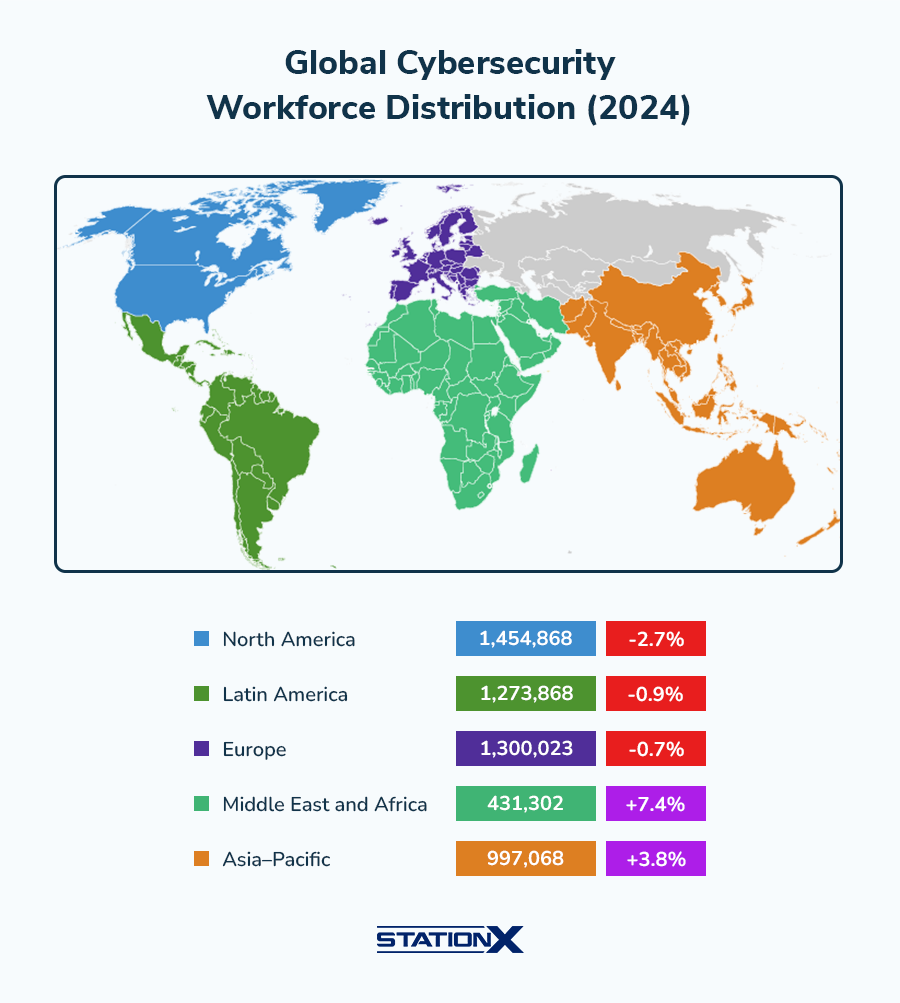
- In the United States, 514,359 cyber security job listings were posted online in the 12 months ending April 2025 — a 12% increase year-over-year (+57,000 new listings).
- The top US states for cyber security job openings are Virginia (53,855), California (44,344), Texas (42,559), Maryland (27,050), and Florida (23,792). These top five states account for roughly 37% of all US cyber security postings.
Cyber Security Spending and Market Size
- The global cyber security market is valued at approximately $219–$272 billion in 2025, depending on the methodology used. It is projected to reach $360–$425 billion by 2030, with a CAGR of 9.5%–13.8%.
- Gartner forecasts that global end-user spending on information security will total $213 billion in 2025 and $240 billion in 2026, representing a 12.5% year-over-year increase.
- The cost of cybercrime is projected to reach $10.5 trillion annually in 2025, up from $3 trillion in 2015 — making it the third-largest "economy" in the world after the US and China.
- On average, organizations spend 35%–45% of their total cyber security budget on staffing and talent, making it the single largest expense within most security budgets.
- Security software leads all spending categories, growing from $95 billion in 2024 to $106 billion in 2025 and a projected $121 billion in 2026.
- Cyber security budgets grew by an average of 4% in 2025, down from 8% the prior year. As a share of overall IT budgets, cyber security spending declined slightly from 11.9% to 10.9%.
Note: This last figure may seem to conflict with stats #9 and #56 elsewhere in this article, which show double-digit increases in absolute security spending and strong executive intent to invest more. The figures aren't contradictory — they measure different things. Budget growth slowing from 8% to 4% year-over-year simply means organizations are spending more, but at a decelerating rate. Stats #9 and #57 reflect total dollars spent and forward-looking executive sentiment respectively, both of which can rise even as the growth rate cools.
Salary Trends in Cyber Security
Salaries for cyber security roles vary considerably depending on experience, location, and credentials. North America leads globally on median pay, though several European countries rank ahead of the US on a country-by-country basis. The tables below break this down in detail.
Average Salaries for Cyber Security Roles
- Based on aggregated industry data for 2025–2026, here is a rundown of US salary ranges for key cyber security roles:
| Rank | Role | Entry-Level | Mid-Level | Senior / Top-End |
| 1 | CISO | $175,000 | $250,000 | $350,000–$500,000+ |
| 2 | Security Architect | $110,000–$130,000 | $145,000 | $180,000–$226,000 |
| 3 | Security Engineer | $85,000–$100,000 | $115,000–$128,000 | $145,000–$197,000 |
| 4 | Penetration Tester | $75,000–$90,000 | $100,000–$115,000 | $130,000–$165,000 |
| 5 | Cybersecurity Consultant | $90,000 | $110,000 | $150,000+ |
| 6 | Security Analyst | $75,000–$105,000 | $85,000 | $110,000–$135,000 |
| 7 | Incident Response Analyst | $80,000 | $100,000 | $120,000+ |
| 8 | SOC Analyst | $55,000–$70,000 | $75,000 | $95,000–$120,000 |
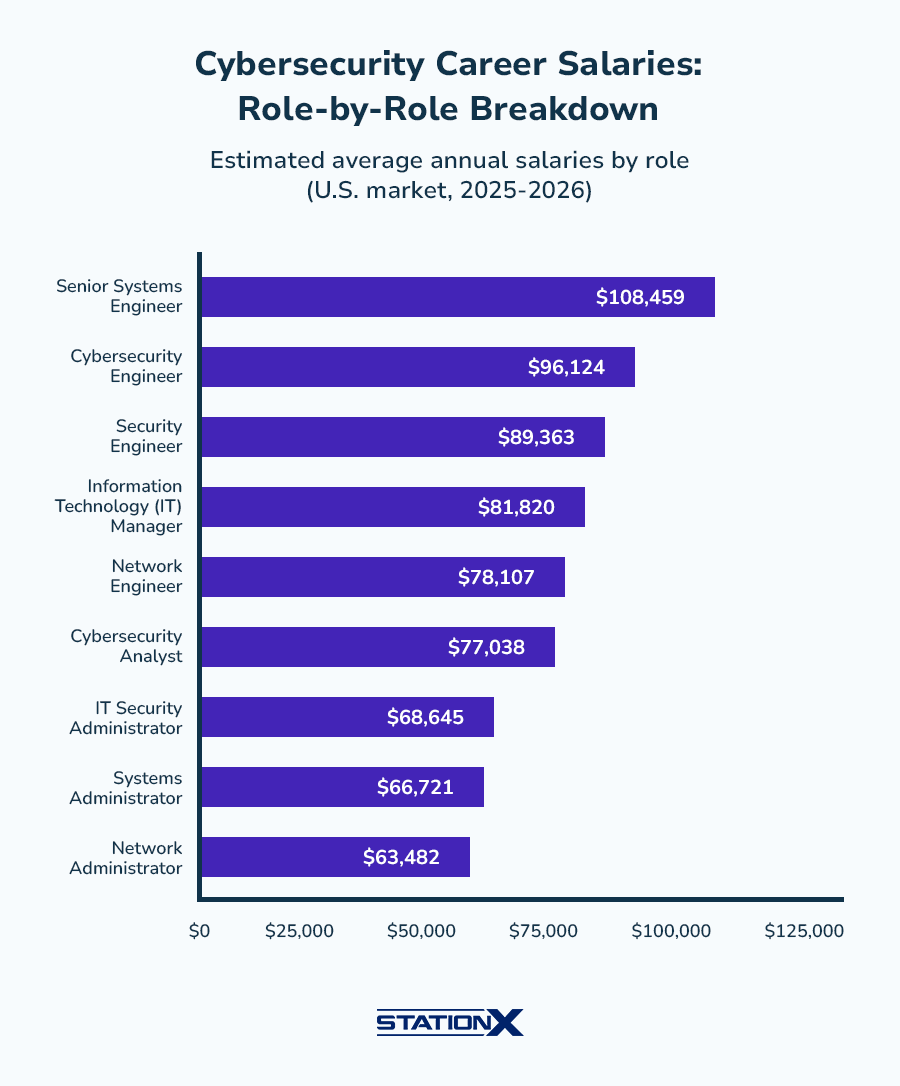
- The median salary for information security analysts in the US is $124,910, according to the Bureau of Labor Statistics (May 2024 data, the latest available).
- Salaries vary significantly by experience level:
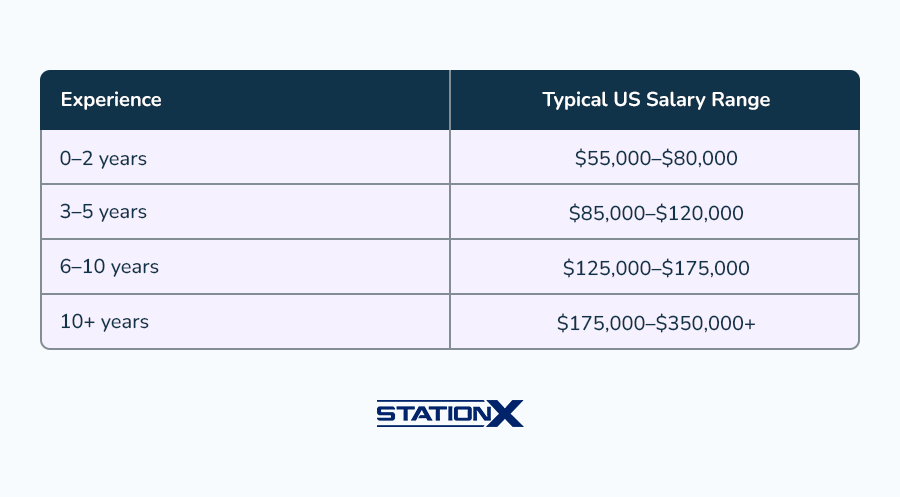
- Certifications provide measurable salary premiums. CISSP holders earn an estimated $25,000–$35,000 more than non-certified peers. CISM adds roughly $22,000, and CompTIA Security+ adds $10,000–$15,000.
Cyber Security Salaries by Location
- US salaries vary widely by city. Here's a comparison for mid-to-senior security engineers and architects:
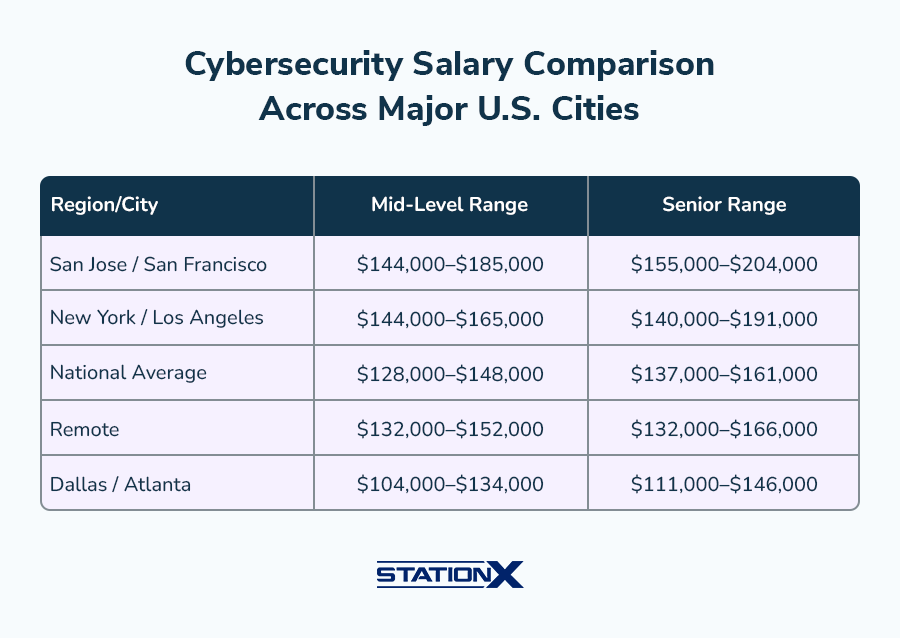
- Globally, the highest-paying countries for cyber security professionals are:
| Rank | Country | Average Salary Range (USD) |
| 1 | Switzerland | $160,000–$198,000 |
| 2 | United States | $135,000–$170,000 |
| 3 | Luxembourg | $125,000–$150,000 |
| 4 | United Arab Emirates | $120,000–$145,000 (tax-free) |
| 5 | Australia | $105,000–$140,000 |
| 6 | Singapore | $105,000 (median) |
| 7 | Germany | $105,000–$130,000 |
| 8 | United Kingdom | $76,000–$152,000 |
| 9 | Canada | $58,000–$95,000 |
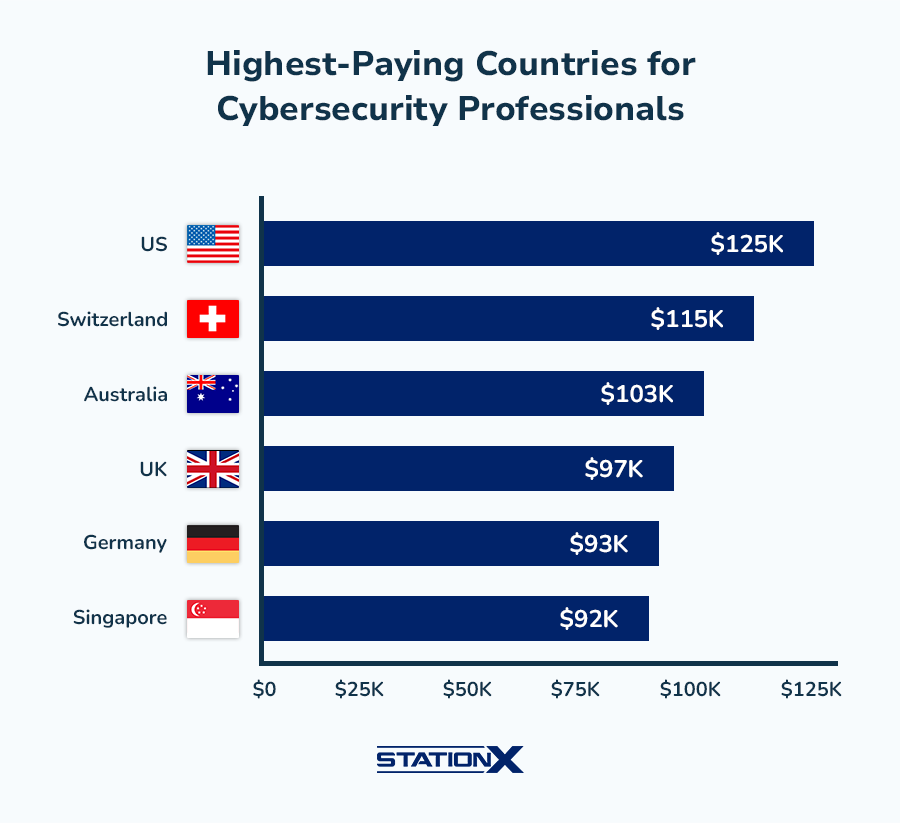
- Regional median salaries show a significant global divide:
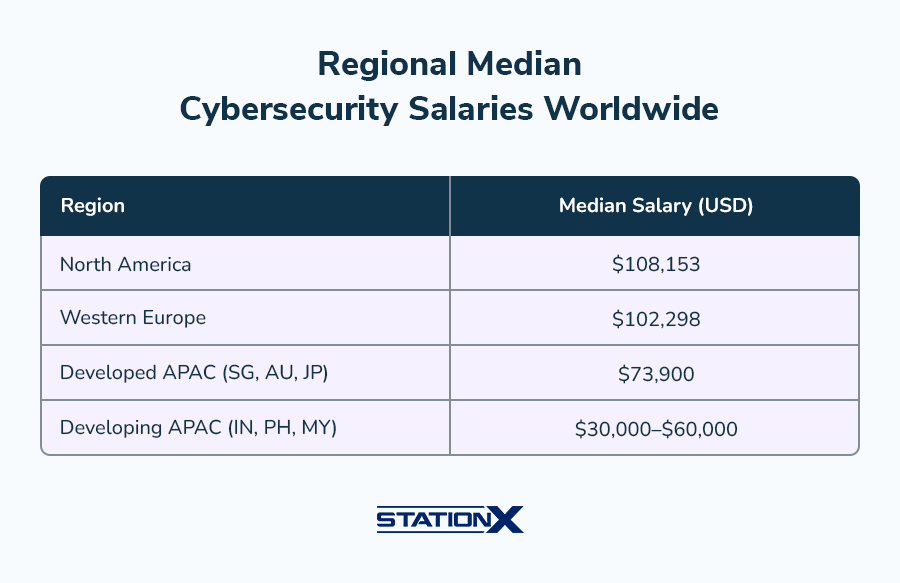
Supply and Demand in Cyber Security Employment
The cyber skills gap is still growing, and the reasons organizations struggle to close it are shifting. The sections below cover both the scale of the shortage and what's driving it.
The Global Cyber Security Skills Gap
- An estimated 4.8 million extra cyber security workers are needed globally to meet the needs of employers. This gap increased by 19.1% compared to 2023 — and by 41% compared to 2022.
- The global workforce would need to grow by 87% to close the current gap. (ISC2, 2024)
- 88% of organizations experienced at least one significant cyber security consequence due to skills deficiencies in the past year. 69% experienced multiple incidents.
- 55% of cyber security teams are understaffed, and 65% have unfilled positions.
- 86% of organizations experienced at least one cyber breach in 2024. Of those, 54% cited a lack of IT security skills and training as a leading cause.
- The financial consequences are mounting: over 52% of organizations say cyber incidents cost them more than $1 million in 2024, up from 38% in 2021.
- 74% of respondents say the current threat landscape is the most challenging they have faced in the last five years.
- For the first time, budget constraints rank ahead of talent scarcity as the leading reason for unfilled roles — though narrowly. 33% of organizations cite inadequate budget for staffing, while 29% say they cannot afford candidates with the skills they need. The two figures likely reflect the same underlying pressure from different angles, suggesting the gap between them is less a structural shift than a sign that cost and talent availability are increasingly the same problem.
- In the US, only 74 workers are available for every 100 cyber security job openings — down from 80 the year before, indicating the gap is widening.
Cyber Security Supply and Demand by Region
- Here's a breakdown of the workforce gap by country (2024):
| Country | 2024 Gap | Change from 2023 |
| China | 2.048 million | +19.0% |
| India | 1.074 million | +35.9% |
| United States | 504,000 | +4.4% |
| Japan | 170,000 | +53.8% |
| Germany | 120,000 | +15.0% |
| United Kingdom | 93,000 | +27.1% |
- By region, the Asia-Pacific gap is by far the largest at approximately 3.4 million unfilled positions. North America has a gap of roughly 543,000, Latin America around 398,000, Europe approximately 392,000, and the Middle East & Africa around 125,000.
Educational and Certification Trends
Hiring practices in cyber security have shifted noticeably in recent years, with certifications gaining ground on degrees as the credential employers value most. The data below also covers where candidates are coming from and how employers are broadening their search.
Certifications vs. Degrees
- 47% of hiring managers list certifications as a critical attribute for entry-level and junior candidates — ahead of educational attainment at 43%. IT experience sits between them at 44%.
- 89% of hiring managers would consider candidates with only an entry-level cyber security certification and no degree. By comparison, 81% would consider candidates with only a degree in IT, cyber security, or computer science — meaning a degree alone ranks lower than a certification.
- 90% of hiring managers would consider candidates with only prior IT work experience — no degree and no certification. Practical experience remains the most valued credential.
- 84% of employers now use skills-based assessments for entry-level and junior candidates, prioritizing demonstrable ability over credentials on paper.
- Over 90% of security leaders fund employee certifications, recognizing their value for both retention and organizational security.
Most In-Demand Certifications
- Based on CyberSeek's analysis of job posting data, here are the most-requested certifications alongside the number of people who hold them:
| Certification | Job Postings Requesting It | Certification Holders |
| CISSP | 82,494 | 91,765 |
| CompTIA Security+ | 70,019 | 265,992 |
| CISA | 52,337 | 35,812 |
| CISM | 44,347 | 20,300 |
| GIAC | 41,070 | 46,318 |
| CIPP | 7,590 | 13,652 |
Note: CISA and CISM have significantly more job postings than certification holders, indicating an acute demand-supply imbalance for those credentials.
- New AI-focused certifications launched in 2025, reflecting the industry's rapid AI integration: ISACA's AAISM (AI Security Management) and AAIA (AI Audit).
Learn about The 10 Best Cyber Security Certifications for Beginners.
Pathways to Cyber Security Jobs and Workforce Diversity
- Mid-career changers are flooding into cyber security. The 39–49 age group's share of new entrants nearly doubled from 18% in 2022 to 35% in 2024.
- 27% of employers actively recruit from non-computer science undergraduate programs, and 22% source candidates from internal non-IT departments — including finance (39%), HR (38%), communications (37%), customer service (35%), and marketing (31%).
- 55% of employers use internships as an entry-level pipeline, and 46% use apprenticeships. Most employers (81%) report that entry-level training takes less than one year.
- Women comprise 22% of security teams globally on average. 16% of organizations have zero female cyber security employees, and only 5% have achieved gender parity.
- Among younger professionals (under 30), female representation is higher at 26%. Women are projected to represent 30% of the global cyber security workforce by 2025 and 35% by 2031.
- A gender pay gap persists. In the US, women in cyber security average $141,066 compared to $148,035 for men — a roughly 5% gap. Only 7% of women reach C-level positions (CISO, CTO, CIO).
Cyber Security Careers with the Most Openings
Cloud security and AI security dominate the list of most-needed skills, while incident response job postings have more than doubled in a single year. The World Economic Forum ranks cyber security as the second fastest-growing skill category globally through 2030, behind only AI and big data.
If you need to top up your credentials in cloud security, take a look at our guide, The Best Cloud Security Certifications to Boost Your Career.
- The most in-demand cyber security skills for 2025–2026, ranked by cross-source consensus:
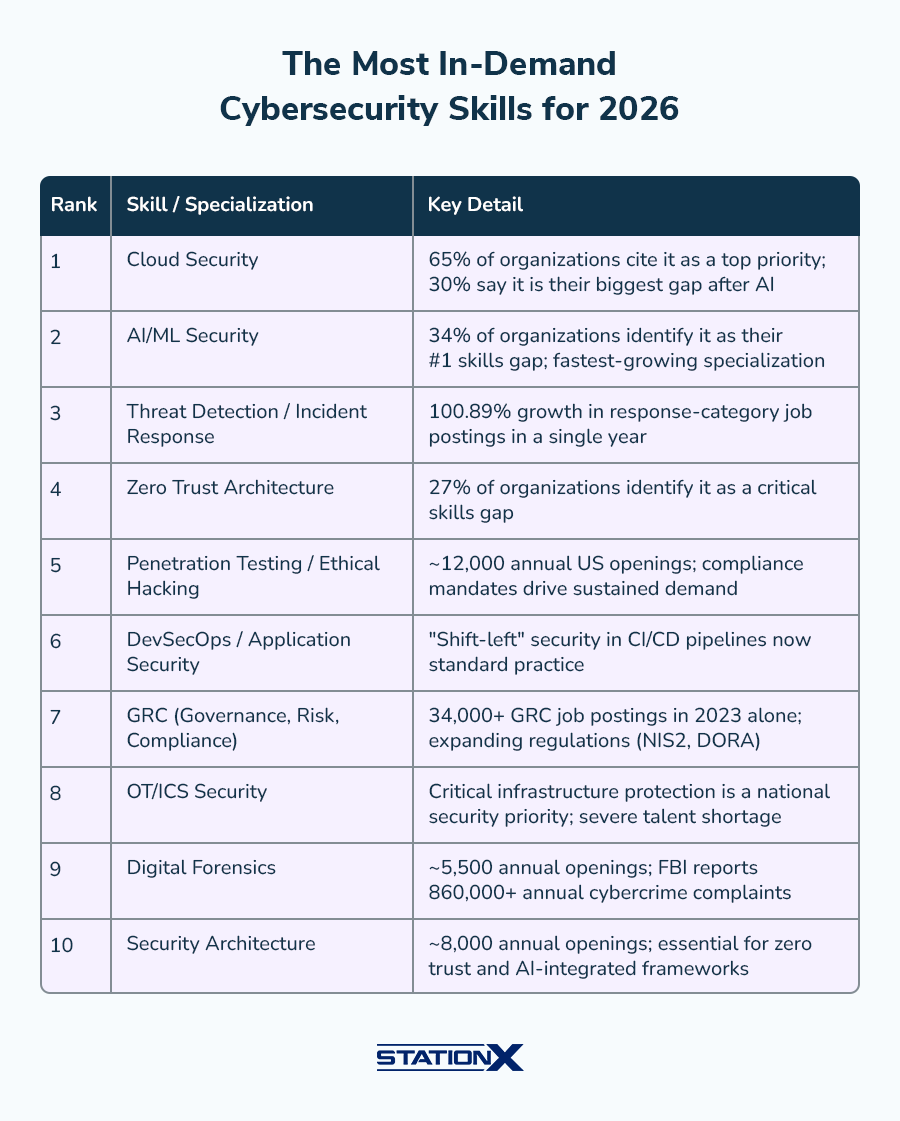
- 95% of cyber security teams report at least one skill need, up 5 percentage points from 2024. 59% report critical or significant skill needs — up sharply from 44% the year before. The top skill gaps are AI (41%), cloud security (36%), risk assessment (29%), and application security (28%).
Read Top Cyber Security Skills You Need for an Exciting Career to see a complete list of skills to develop and resources to learn them.
Also, check out Entry Level Cyber Security Jobs: A Must-Read Beginner's Guide.
Changes in the Cyber Security Job Market
AI is having a visible impact on cyber security hiring, both in the skills employers are asking for and in how existing roles are changing. This section also looks at how the job market has held up against the broader pressures affecting the tech sector.
Growth of AI and Its Impact on Cyber Security Jobs
- 97% of organizations are using or planning to use AI-enabled cyber security tools. 88% of security teams report significant time savings from machine learning and large language model integration.
- AI is now the #1 most-needed skill in cyber security, cited by 41% of respondents — surpassing cloud security (36%) for the first time. 64%+ of cyber security job listings in 2026 require AI, ML, or automation skills.
- AI is restructuring the workforce, not replacing it. 52% of professionals believe AI will reduce demand for entry-level roles like Tier 1 SOC analysts and routine vulnerability scanners. But only 2% believe AI will fully replace cyber security professionals.
- Organizations extensively using AI in security achieve an average $1.9 million reduction in breach costs.
- The AI-in-cybersecurity market is valued at approximately $30.9 billion in 2025, growing at a 22%–24% CAGR — roughly double the growth rate of the overall cyber security market. The generative AI sub-segment alone is worth $8.65 billion, expected to reach $35.5 billion by 2031.
- New AI-specific security roles are growing at 25%+ annually, including AI Threat Hunter, AI Security Architect, Model Security Engineer, Zero Trust Architect, and AI Governance Specialist. The SANS Institute has identified 10 emerging AI-focused cyber security positions.
Hiring Trends and Economic Resilience
- Cyber security remains remarkably resilient to broader tech layoffs. Layoffs within the sector declined to 24% of respondents in 2025 (down 1 point from 2024), while budget cuts fell to 36% (also down 1 point). However, hiring freezes remained flat at 39% (up 1 point).
- 34% of organizations now report adequate staffing levels — up 4 points year-over-year, suggesting modest improvement despite the overall gap.
- Cyber security job postings are projected to grow 18%–22% year-over-year through 2026, significantly outpacing average IT roles. The BLS projects 29% growth for information security analysts through 2034 — the fifth-fastest of all occupations.
- 85% of executives plan to increase cyber security spending, according to a McKinsey survey. Nearly 15% of corporate cyber security spending now comes from outside the CISO's office, and non-CISO cyber spending is expected to grow at 24% CAGR over the next three years.
Remote Work in Cyber Security
- Only 8% of cyber security roles at Fortune 100 companies currently offer fully remote work options — significantly lower than many assume given the industry's digital nature.
- However, remote and hybrid roles remain prevalent in the broader market, driven by the severe talent shortage. Companies recruiting from national or global talent pools often offer flexible work arrangements as a competitive necessity. Remote security engineers earn $132,000–$166,000 at the senior level — competitive with many in-office markets.
- Taken together, remote opportunities in cyber security exist but are concentrated away from the largest employers. Job seekers open to smaller organizations or startups will find significantly more flexibility.
Conclusion
The cyber security job market in 2026 is growing, but not in a straight line. Nearly 5.5 million professionals are employed in the field worldwide, yet the gap of unfilled positions has widened to 4.8 million and grew by 19% in a single year. Organizations are spending more on security than ever, but budget constraints have edged ahead of talent scarcity as the leading reason roles go unfilled. AI is automating routine tasks while simultaneously becoming the most sought-after skill in the industry.
The gap isn't simply a headcount problem waiting to be solved by more hiring, nor purely a skills quality problem that better training will fix. The data suggests it's both, and the two are getting harder to separate as budget constraints limit hiring and existing teams struggle to keep pace with rapidly shifting demands.
What hasn't changed is the underlying strength of the job market. Certifications now carry more weight than degrees in hiring decisions. Mid-career changers are being actively recruited. The BLS projects 29% job growth for information security analysts through 2034 (fifth fastest of all occupations). For anyone entering or advancing in cyber security, the demand isn't going anywhere.
If you're looking to enter the cyber security job market, the StationX Master's Program can help. Access to mentors, custom career and certification roadmaps, courses, practice labs, and a supportive community can put your career into high gear. Join today, or purchase one of our course bundles (click the banner below to see what we have to offer).
We have bundles on:
- Pentesting, red teaming, and web app hacking
- Certification prep, including CompTIA, ISC2, AWS, Cisco, and Azure
- DevSecOps and Coding
- Linux
- AI
- And much more!
Frequently Asked Questions
Sources
- ISC2 Cybersecurity Workforce Study, 2024
- ISC2 Cybersecurity Workforce Study, 2025
- ISC2 Hiring Trends Study, June 2025
- ISC2: Women Comprise 22% of Cybersecurity Workforce, March 2025
- ISACA State of Cybersecurity, 2025
- Fortinet Cybersecurity Skills Gap Report, 2025
- NIST/CyberSeek, June 2025
- CyberSeek Heat Map, 2025
- Bureau of Labor Statistics, Occupational Outlook Handbook
- Gartner: End-User Spending on Information Security, 2025
- Fortune Business Insights: Cyber Security Market Report
- Grand View Research: Cyber Security Market Report
- Deloitte: Global Future of Cyber Survey, 4th Edition (2024)
- Cybersecurity Ventures: Cybercrime Damages
- World Economic Forum: AI and Cybersecurity Professionals
- World Economic Forum: Future of Jobs Report, 2025
- Mordor Intelligence: AI in Cybersecurity Market
- Marketsand Markets: Generative AI in Cybersecurity
- Cyber SN: U.S. Cybersecurity Job Posting Data Report, 2025
- McKinsey/Cybersecurity Ventures: Cybersecurity Budgets 2026
- GovTech/Lohrmann: Cyber Budgets and AI, 2025
- Programs.com: Women in Cybersecurity Statistics
- Cybersecurity Ventures: Women in Cybersecurity Report
- Training Camp: New Certifications Coming in 2026
- Cybersecurity District: Workforce Trends for 2026
- CompareCheapSSL: Cybersecurity Job Salary Statistics





Very useful information.
Many thanks.
While we’re looking for the dream role to aim and checking the salaries. A big thanks to all who are putting up these informations, and making sure we could be well informed.